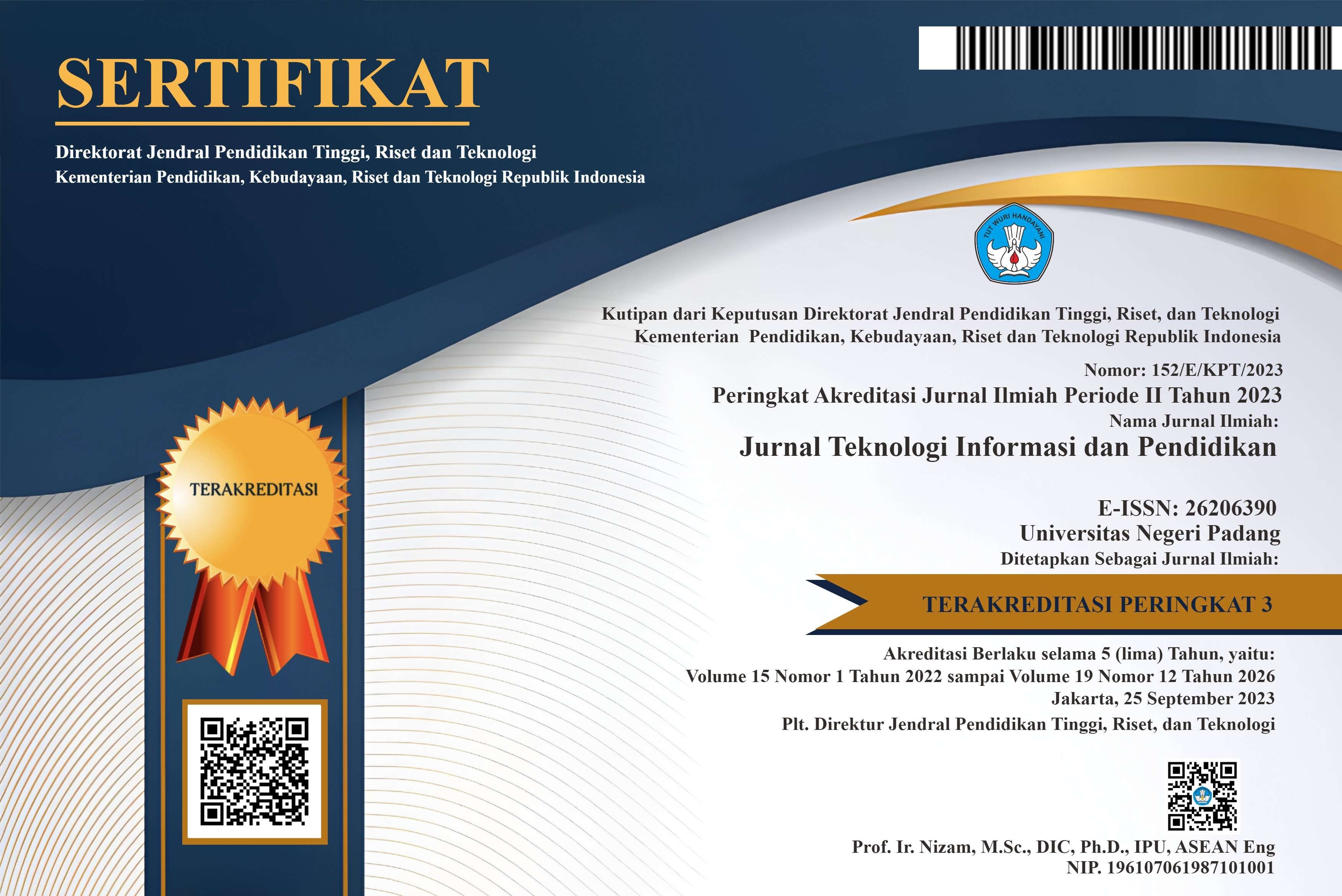The Effect of Privacy Concern Towards the Intention to Accept App Permission on Students Mobile Users
Abstract
Mobile usage has become a part of our daily lives. However, many mobile users ignore the existence of app permissions in an app. One of the reasons is the lack of information related to app permissions. If users are not careful, app permissions can be abused by hackers to steal their data such as SMS, photos, microphone access, and GPS. The purpose of this study is to observe the perspective of university students in Batam regarding app permissions as well as to see the consequences of that perspective. The basis of this research is using survey method for 132 social media users and regression. This study proves that mobile users’ information privacy concerns have an influence on the intention to accept app permissions, which means that university students of Batam tend to consider personal information privacy on mobile before accepting app permissions. However, computer anxiety and perceived control do not affect mobile users’ information privacy concerns, which means university students of Batam have neither computer anxiety nor perceived control over personal information privacy on mobile.
References
A. D. Samala, B. R. Fajri, and F. Ranuharja, “Desain Dan Implementasi Media Pembelajaran Berbasis Mobile Learning Menggunakan Moodle Mobile App,” J. Teknol. Inf. dan Pendidik., vol. 12, no. 2, pp. 13–19, 2019, doi: 10.24036/tip.v12i2.221.
R. Balebako, J. Jung, W. Lu, L. F. Cranor, and C. Nguyen, “Little brothers watching you:" raising awareness of data leaks on smartphones,” SOUPS 2013 - Proc. 9th Symp. Usable Priv. Secur., 2013, doi: 10.1145/2501604.2501616.
F. Ranuharja, G. Ganefri, B. R. Fajri, F. Prasetya, and A. D. Samala, “Development of Interactive Learning Media Edugame Using Addie Model,” J. Teknol. Inf. dan Pendidik., vol. 14, no. 1, pp. 53–59, 2021, doi: 10.24036/tip.v14i1.412.
M. Kan, “Android Malware Abuses App Permissions to Hijack Phones,” 2019. .
K. Degirmenci, “Mobile users’ information privacy concerns and the role of app permission requests,” Int. J. Inf. Manage., vol. 50, pp. 261–272, Feb. 2020, doi: 10.1016/j.ijinfomgt.2019.05.010.
S. Rosenthal, O. C. Wasenden, G. A. Gronnevet, and R. Ling, “A tripartite model of trust in Facebook: acceptance of information personalization, privacy concern, and privacy literacy,” Media Psychol., vol. 23, no. 6, pp. 1–25, 2019, doi: 10.1080/15213269.2019.1648218.
E. W. T. Darmaningrat, H. M. Astuti, and F. Alfi, “Information Privacy Concerns Among Instagram Users: The Case of Indonesian College Students,” J. Inf. Syst. Eng. Bus. Intell., vol. 6, no. 2, p. 159, 2020, doi: 10.20473/jisebi.6.2.159-168.
V. Paramarta, M. Jihad, A. Dharma, I. C. Hapsari, P. I. Sandhyaduhita, and A. N. Hidayanto, “Impact of user awareness, trust, and privacy concerns on sharing personal information on social media: Facebook, twitter, and instagram,” 2018 Int. Conf. Adv. Comput. Sci. Inf. Syst. ICACSIS 2018, pp. 271–276, 2019, doi: 10.1109/ICACSIS.2018.8618220.
C. B. Foltz and L. Foltz, “Mobile users’ information privacy concerns instrument and IoT,” Inf. Comput. Secur., vol. 28, no. 3, pp. 359–371, 2020, doi: 10.1108/ICS-07-2019-0090.
T. D. Dos Santos and V. F. De Santana, “Computer anxiety and interaction: A systematic review,” 2018, doi: 10.1145/3192714.3192825.
E. Princi and N. C. Krämer, “Out of Control – Privacy Calculus and the Effect of Perceived Control and Moral Considerations on the Usage of IoT Healthcare Devices,” Front. Psychol., vol. 11, no. November, 2020, doi: 10.3389/fpsyg.2020.582054.
A. N. Septikasari, M. Maison, and ..., “Interactive E-book for Physics Learning: Analysis of Students’ Characters and Conceptual Understanding,” … J. Sci. …, vol. 04, no. March, pp. 25–36, 2021, doi: 10.24042/ijsme.v4i1.7664.
E. O. Kurniawati, A. Kusyanti, and R. I. Rokhmawati, “Analisis Faktor-Faktor yang Memengaruhi Pemahaman Privasi Informasi pada Pengguna Smartphone di XYZ dengan menggunakan Mobile User ’ s Information Privacy Concerns ( MUIPC ),” J. Pengemb. Teknol. Inf. dan Ilmu Komput., vol. 2, no. 4, pp. 1358–1365, 2018.
V. M. Wottrich, E. A. van Reijmersdal, and E. G. Smit, “The privacy trade-off for mobile app downloads: The roles of app value, intrusiveness, and privacy concerns,” Decis. Support Syst., vol. 106, pp. 44–52, 2018, doi: 10.1016/j.dss.2017.12.003.
M. J. Tsai, C. Y. Wang, and P. F. Hsu, “Developing the Computer Programming Self-Efficacy Scale for Computer Literacy Education,” J. Educ. Comput. Res., vol. 56, no. 8, pp. 1345–1360, 2019, doi: 10.1177/0735633117746747.
Copyright (c) 2021 Jurnal Teknologi Informasi dan Pendidikan

This work is licensed under a Creative Commons Attribution-ShareAlike 4.0 International License.















.png)














